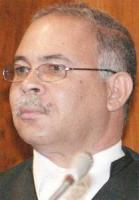







|
News and Information
Fair trial rights stressed in high treason ruling
| March 8, 2011 |
 By: WERNER MENGES By: WERNER MENGES
THE right to a fair trial was the principal ground for the ruling in which the prosecution in the main Caprivi high treason trial has been prevented from presenting newly obtained evidence as the trial continues.
Judge Elton Hoff ruled in the High Court on the grounds of Windhoek Central Prison on February 24 that the prosecution may not present recently obtained evidence from ten potential State witnesses to the court. The ruling followed on a defence objection to the prosecution’s plan to present the testimony of ten witnesses from whom the Police obtained new witness statements between the end of last year and the end of January.
Judge Hoff handed down the reasons for his ruling – which was the first of its kind in Namibia – on Thursday last week.
In his judgement, Judge Hoff noted that the prosecution’s 350th witness was about to be sworn in to testify when the defence raised its objection.
He also noted that the 113 remaining accused facing charges in the trial pleaded to the charges on March 15 2004 – almost seven years ago.
More than four years after the start of the trial, the prosecution informed the court on September 10 2008 that it had disclosed to the defence all the statements made by State witnesses that were contained in the Police docket on the case.
On January 31 this year, though, the defence was provided with the ten new witness statements that prompted the objection to their evidence.
Five of these witnesses had also made witness statements previously, while the other five gave their witness statements for the first time between the last days of December last year and January 28.
In their statements the witnesses dealt with events that took place as far back as during 1998, when scores of residents of the Caprivi Region took up refuge in Botswana, from where they allegedly plotted to stage a separatist uprising in the Caprivi Region.
In his ruling Judge Hoff stated: “The right of the State to present evidence obtained by way of continuous investigations during the course of the trial must be limited by the right of accused persons to a fair trial.”
He said the court has to accept the defence lawyers’ statement that if they had known of the newly-obtained evidence earlier in the trial they could have conducted their defence case differently and could have posed different questions to the prosecution’s witnesses during cross-examination.
In this regard the high treason suspects’ right to cross-examine witnesses would be violated, and this would in turn impact on their constitutional right to a fair trial, if the State was to be allowed to present the new evidence to the court, the judge remarked.
A continuous investigation “does not screech to a halt at the commencement of a trial and where a new document or witness comes forward the State would be entitled to make use thereof,” Judge Hoff said. He added, though, that in his view the State “does not have an unqualified right to produce a new document or lead a new witness during any stage of this trial”.
The late disclosure of witness statements to the defence is tantamount to no disclosure at all, and where such a failure can be expected to limit accused persons’ right to cross-examination and their opportunity to present their defence case to the court, evidence based on such statements can be excluded from the trial, Judge Hoff said.
In the case at hand, he said, the constitutional rights that would be violated if the ten witnesses are allowed to testify on the contents of their new witness statements are the right of an accused person to be released should a trial not take place within a reasonable time, the right to cross-examine witnesses and to place evidence before the court, and the right to be given adequate time and facilities for the preparation and presentation of their case to the court.
Judge Hoff added that, with previous testimony in the trial having been reported in the media, there is a real risk that the evidence supposed to be given by the ten witnesses did not emanate from their own knowledge or memory, but had been obtained by them from secondary sources. In these circumstances it may be virtually impossible for the court to distinguish between the witnesses’ original knowledge and “implanted” knowledge, he said.
“This in turn creates a very real trial related prejudice, and the impression is created that the State patches up its case as gaps are discovered,” the Judge commented.
The trial continued yesterday.
--------------------------------------------------------------------------------
|
Source: www.namibian.com.na |
| http://www.namibian.com.na/news/full-story/archive/2011/march/article/fair-trial-rights-stressed-in-high-treason-ruling/ |
|
| Support Caprivi Freedom |
Fill out the form below to become a member of this site and receive our regular newsletter.
|

|

